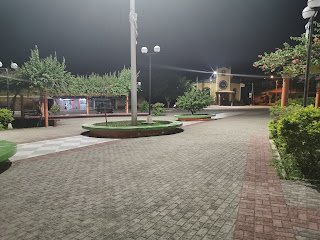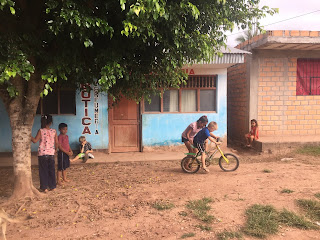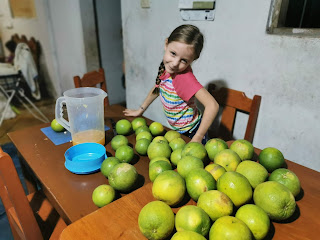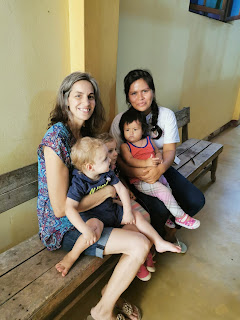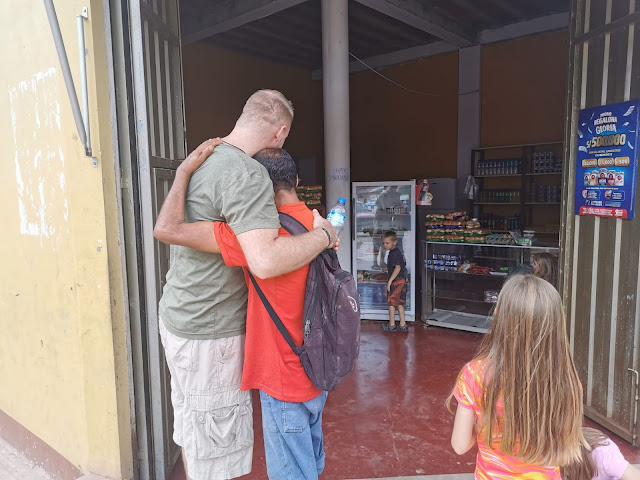 |
| This man's "shoes" were made out of belts. |
This is also the new norm for many, many people in Peru during the quarantine.
As we mentioned in our previous blog post, the quarantine
here is preventing people from working.
And when you don’t work, you don’t eat.
People here who otherwise are able to feed their families fine are
lacking adequate food day after day because they simply don't have the
money to buy it since they're not able to work.
After we had been quarantined for 5 days, another missionary family contacted us to ask if we could help a couple families in the pueblo they used to live in with getting food. Like so many others, the quarantine kept these families from working and so they were out of food and out of money before the week was even over.
Robert brought them into the nearest town of Picota to take them to the market, and while he was there he noticed a number of people who were buying tiny amounts of food. He asked them if he could help them buy more food for their families also. After this trip, it got us starting to think about ways that we could start getting food out to so many others who were in the same predicament.
After we had been quarantined for 5 days, another missionary family contacted us to ask if we could help a couple families in the pueblo they used to live in with getting food. Like so many others, the quarantine kept these families from working and so they were out of food and out of money before the week was even over.
Robert brought them into the nearest town of Picota to take them to the market, and while he was there he noticed a number of people who were buying tiny amounts of food. He asked them if he could help them buy more food for their families also. After this trip, it got us starting to think about ways that we could start getting food out to so many others who were in the same predicament.
 We started making bags of common staples that we handed out
to some of the poorer people in our pueblo.
Then we talked with one of the ladies that we had taken grocery shopping
about other people in her pueblo who were also in need of food. She put together a list of people and also a
list of food she thought would be best to have in the bags we put together. So the guys went back to Picota and bought
food in bulk so that we could put 28 bags together. We brought the food to her house, bagged it
all up, and they called the people to come over and grab the bags.
We started making bags of common staples that we handed out
to some of the poorer people in our pueblo.
Then we talked with one of the ladies that we had taken grocery shopping
about other people in her pueblo who were also in need of food. She put together a list of people and also a
list of food she thought would be best to have in the bags we put together. So the guys went back to Picota and bought
food in bulk so that we could put 28 bags together. We brought the food to her house, bagged it
all up, and they called the people to come over and grab the bags.
After this, we realized that some people were getting
financial help from the government but that was only people who have bank
accounts, which not everyone has. We
also learned that the municipality of Picota was providing some sort of food
basket for the people most in need in certain pueblos, our own pueblo being one
of them. But pueblos categorized as
“rural” were not receiving these baskets.
 |
| The bags provide enough food for a family for 5-7 days. |
Our next stop, then, was a small community of 40 families off
the main road near us. We found out that none of the families there had received any help.
So we bought more food in bulk and delivered bags out to that community,
and then to another pueblo down the road from us.
 By that point, we had run out of funds to buy more food so
we sent out an e-mail update to all of the people who support us on mission. We explained what we were doing and asked for
help in raising more money to keep buying food to reach other areas that hadn’t
yet received any help. We were blown
away at the response! Not only did that group
help out but they also got the word out quickly to others and we immediately
had more funds to visit more pueblos.
By that point, we had run out of funds to buy more food so
we sent out an e-mail update to all of the people who support us on mission. We explained what we were doing and asked for
help in raising more money to keep buying food to reach other areas that hadn’t
yet received any help. We were blown
away at the response! Not only did that group
help out but they also got the word out quickly to others and we immediately
had more funds to visit more pueblos.  |
| This entire community was in need of help. |
There are still many more people in need in other pueblos up the foothills that we weren’t able to visit on our first trip up there. We had plans to go back there but the travel restrictions have since become more strict and we’re not allowed to go past a certain point on the road into Picota. So not only can we not visit those pueblos now but we also can’t go into Picota to buy more food.
 |
| Meeting Jose on the road to transfer the food. |
Luckily, our friend Jose lives near Picota and has been buying the food for us and has been allowed to meet us at one of the checkpoints (most recently, he’s been allowed all the way to our town) and the guys transfer the food from his truck to ours.
So now at this point, we’re making a second trip to all the pueblos
along the Ponaza valley road. It’s been
at least 2 weeks since we visited them last and the food that they had received
has been gone for awhile. We will
continue to keep bringing food to these pueblos for as long as the quarantine
continues and as long as we have the funds.
Our quarantine began on March 12th.
It was supposed to end on May 24th, but has been extended for the fifth
time until June 30th. It is shameful what the government is doing by
keeping the people
quarantined for so long. The financial
assistance and food baskets are temporary fixes; they only help for short
periods of time. More people are going
hungry as a direct result of being quarantined than would have ever contracted
the virus. It is ironic that the purpose
of the quarantine is to keep people healthy, and yet it is the quarantine that
is causing so many people (here and throughout the world) to be malnourished, and for some, literally starve to
death.
As you cope with the effects of the quarantine in your own
life, please remember the poor and offer up your prayers, trials, and suffering
for them, and for an end to the oppressive mandates and restrictions here in Peru and around the world.


